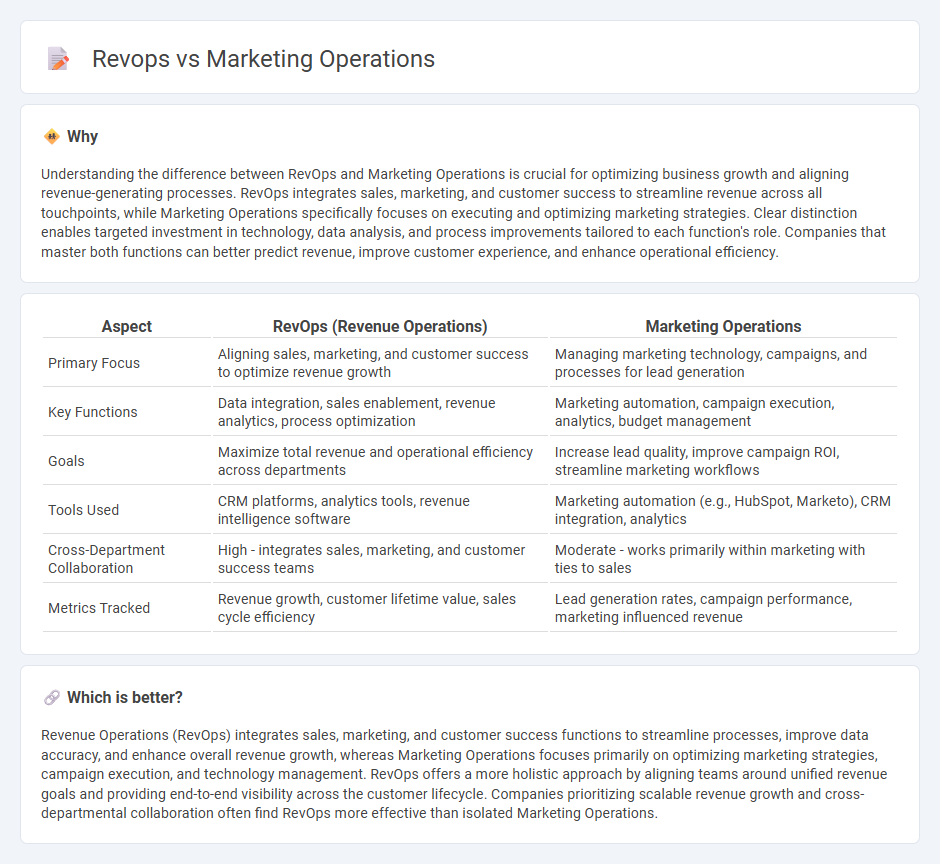
Revenue Operations (RevOps) integrates sales, marketing, and customer success data to streamline processes and drive growth, focusing on aligning goals and enhancing efficiency across revenue-generating teams. Marketing Operations concentrates on optimizing marketing strategies, managing campaigns, and analyzing performance metrics to increase lead generation and campaign effectiveness. Explore how combining RevOps and Marketing Operations can maximize sales performance and business scalability.
Why it is important
Understanding the difference between RevOps and Marketing Operations is crucial for optimizing business growth and aligning revenue-generating processes. RevOps integrates sales, marketing, and customer success to streamline revenue across all touchpoints, while Marketing Operations specifically focuses on executing and optimizing marketing strategies. Clear distinction enables targeted investment in technology, data analysis, and process improvements tailored to each function's role. Companies that master both functions can better predict revenue, improve customer experience, and enhance operational efficiency.
Comparison Table
| Aspect | RevOps (Revenue Operations) | Marketing Operations |
|---|---|---|
| Primary Focus | Aligning sales, marketing, and customer success to optimize revenue growth | Managing marketing technology, campaigns, and processes for lead generation |
| Key Functions | Data integration, sales enablement, revenue analytics, process optimization | Marketing automation, campaign execution, analytics, budget management |
| Goals | Maximize total revenue and operational efficiency across departments | Increase lead quality, improve campaign ROI, streamline marketing workflows |
| Tools Used | CRM platforms, analytics tools, revenue intelligence software | Marketing automation (e.g., HubSpot, Marketo), CRM integration, analytics |
| Cross-Department Collaboration | High - integrates sales, marketing, and customer success teams | Moderate - works primarily within marketing with ties to sales |
| Metrics Tracked | Revenue growth, customer lifetime value, sales cycle efficiency | Lead generation rates, campaign performance, marketing influenced revenue |
Which is better?
Revenue Operations (RevOps) integrates sales, marketing, and customer success functions to streamline processes, improve data accuracy, and enhance overall revenue growth, whereas Marketing Operations focuses primarily on optimizing marketing strategies, campaign execution, and technology management. RevOps offers a more holistic approach by aligning teams around unified revenue goals and providing end-to-end visibility across the customer lifecycle. Companies prioritizing scalable revenue growth and cross-departmental collaboration often find RevOps more effective than isolated Marketing Operations.
Connection
Sales performance directly benefits from the alignment of RevOps and Marketing Operations, as both teams collaborate to streamline revenue processes, optimize lead management, and enhance data-driven decision-making. RevOps integrates sales, marketing, and customer success operations, enabling Marketing Operations to provide accurate pipeline visibility, better campaign attribution, and improved customer segmentation. This synergy accelerates the sales cycle, increases conversion rates, and drives predictable revenue growth through unified metrics and technology platforms.
Key Terms
Campaign Management (Marketing Operations)
Marketing Operations specializes in campaign management by optimizing processes, tools, and data analytics to ensure efficient marketing execution and accurate performance tracking. Revenue Operations (RevOps) integrates marketing, sales, and customer success to align efforts toward overall revenue growth, focusing beyond just campaigns to include pipeline management and customer retention strategies. Explore the distinct roles of Marketing Operations and RevOps to enhance your organization's go-to-market effectiveness.
Pipeline Management (RevOps)
Marketing Operations centers on campaign execution, data analysis, and lead management to optimize marketing performance. Revenue Operations (RevOps) integrates sales, marketing, and customer success processes with a strong emphasis on pipeline management, ensuring seamless revenue generation and forecasting. Explore how aligning Marketing Operations with RevOps can drive scalable growth and revenue predictability.
Attribution Modeling (Marketing Operations)
Marketing Operations centers on attribution modeling by analyzing multi-channel campaign data to accurately assign credit for conversions and optimize budget allocation. RevOps integrates marketing, sales, and customer success metrics to provide a unified revenue attribution model, enhancing overall business performance. Explore more about how attribution modeling fuels strategic marketing decisions and drives revenue growth.
Source and External Links
Everything You Need to Know About Marketing Operations - Marketing operations involves strategizing and optimizing marketing efforts through project management, strategic planning, data management, campaign analysis, and performance measurement to drive team success and efficiency.
The definitive guide to marketing operations (MOps) - Marketing operations (MOps) combines technology, data, and people to manage marketing strategy, analyze performance, maintain marketing technology, and ensure compliance, optimizing departmental efficiency across various functions.
What Is Marketing Operations & What Are Its Benefits? (2024) - Marketing operations supports marketing teams with people, technology, and processes to optimize and scale marketing efforts, manage campaigns, analyze data, and ultimately grow revenue by moving prospects through the marketing funnel.
 dowidth.com
dowidth.com